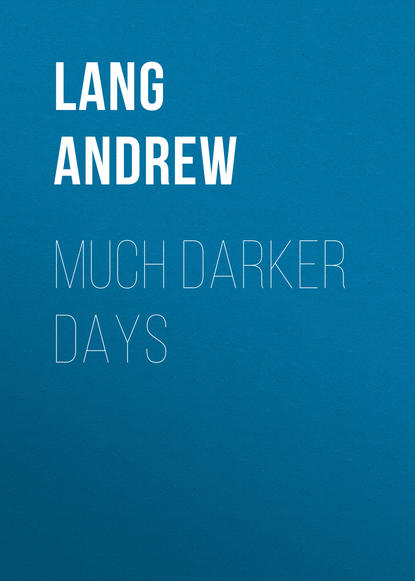По всем вопросам обращайтесь на: info@litportal.ru
(©) 2003-2024.
✖
Much Darker Days
Настройки чтения
Размер шрифта
Высота строк
Поля
‘As you have lived together so long without me,’ some parents would have observed, ‘you can do without me altogether.’
None of these trivial objections occurred to my mother.
She was good-nature itself.
Just returned from a professional tour on the Continent (she was, I should have said, in the profession herself, and admirably filled the exigeant part of Stout Lady in a highly respectable exhibition), my mother at once began to pack up her properties and make ready to accompany us.
Never was there a more good-humoured chaperon. If one of us entered the room where she was sitting with the other, she would humorously give me a push, and observing ‘Two is company, young people, three is none,’ would toddle off with all the alacrity that her figure and age permitted.
I learned from inquiries addressed to the Family Herald (correspondence column) that the Soudan was then, even as it is now, the land safest against English law. Spain, in this respect, was reckoned a bad second.
The very next day I again broached the subject of foreign travel to my mother. It was already obvious that the frost would not last for ever. Once the snow melted, once the crushed mass that had been a baronet was discovered, circumstantial evidence would point to Philippa. True, there was no one save myself who could positively swear that Philippa had killed Sir Runan. Again, though I could positively swear it, my knowledge was only an inference of my own. Philippa herself had completely forgotten the circumstance. But the suspicions of the Bearded Woman and of the White Groom were sure to be aroused, and the Soudan I resolved to seek without an hour’s delay.
I reckoned without my hostess.
My mother at first demurred.
‘You certainly don’t look well, Basil. But why the Soudan?’
‘A whim, a sick man’s fancy. Perhaps because it is not so very remote from Old Calabar, the country of Philippa’s own father. Mother, tell me, how do you like her?’
‘She is the woman you love, and however shady her antecedents, however peculiar her style of conversation, she is, she must be, blameless. To say more, after so short an acquaintance, might savour of haste and exaggeration.’
A woman’s logic!
‘Then you will come to the Soudan with us to-morrow?’
‘No, my child, further south than Spain I will not go, not this journey!’
Here Philippa entered.
‘Well, what’s the next news, old man?’ she said.
‘To Spain, to-morrow!’
‘Rain, rain, Go to Spain,
Be sure you don’t come back again.’
sang sweet Philippa, in childish high spirits.
I had rarely seen her thus!
Alas, Philippa’s nursery charm against the rain proved worse than unavailing.
That afternoon, after several months of brave black frost, which had gripped the land in its stern clasp, the rain began to fall heavily.
The white veil of snow gradually withdrew.
All that night I dreamed of the white snow slowly vanishing from the white hat.
Next morning the snow had vanished, and the white hat must have been obvious to the wayfaring man though a fool.
Next morning, and the next, and the next, found me still in London.
Why?
My mother was shopping!
Oh, the awful torture of having a gay mother shopping the solemn hours away, when each instant drew her son nearer to the doom of an accessory after the fact!
My mother did not object to travel, but she did like to have her little comforts about her.
She occupied herself in purchasing —
A water-bed.
A boule, or hot-water bottle.
A portable stove.
A travelling kitchen-range.
A medicine chest.
A complete set of Ollendorff.
Ten thousand pots of Dundee marmalade. And such other articles as she deemed essential to her comfort and safety during the expedition. In vain I urged that our motto was Rescue and Retire, and that such elaborate preparations might prevent our retiring from our native shore, and therefore make rescue exceedingly problematical.
My Tory mother only answered by quoting the example of Lord Wolseley and the Nile Expedition.
‘How long did they tarry among the pots – the marmalade pots?’ said my mother. ‘Did they start before every mess had its proper share of extra teaspoons in case of accident, and a double supply of patent respirators for the drummer-boys, and of snow-shoes for the Canadian boatmen in case the climate proved uncertain?’
My mother’s historical knowledge, and the unique example of provident and exhaustive equipment which she cited, reduced me to silence, but did not diminish my anxiety. The delay made me nervous, excited, and chippy.
To-morrow morning we were to start.
To-morrow morning was too late.
With an effort I opened the morning paper – the Morning Post, as it happened – and ran hastily up and down the columns, active exercise having been recommended to me. What cared I for politics, foreign news, or even the sportive intelligence? All I sought for was a paragraph headed ‘Horrible Disclosures,’ or, ‘Awful Death of a Baronet.’ I ran up and down the columns in vain.
No such item of news met my eye. Joyously I rose to go, when my eye fell on the Standard.
Mechanically I opened it.
Those words were written (or so they seemed to me to be written) in letters of fire, though the admirable press at Shoe Lane did not really employ that suitable medium.
‘Horrible Discovery near Roding.’











